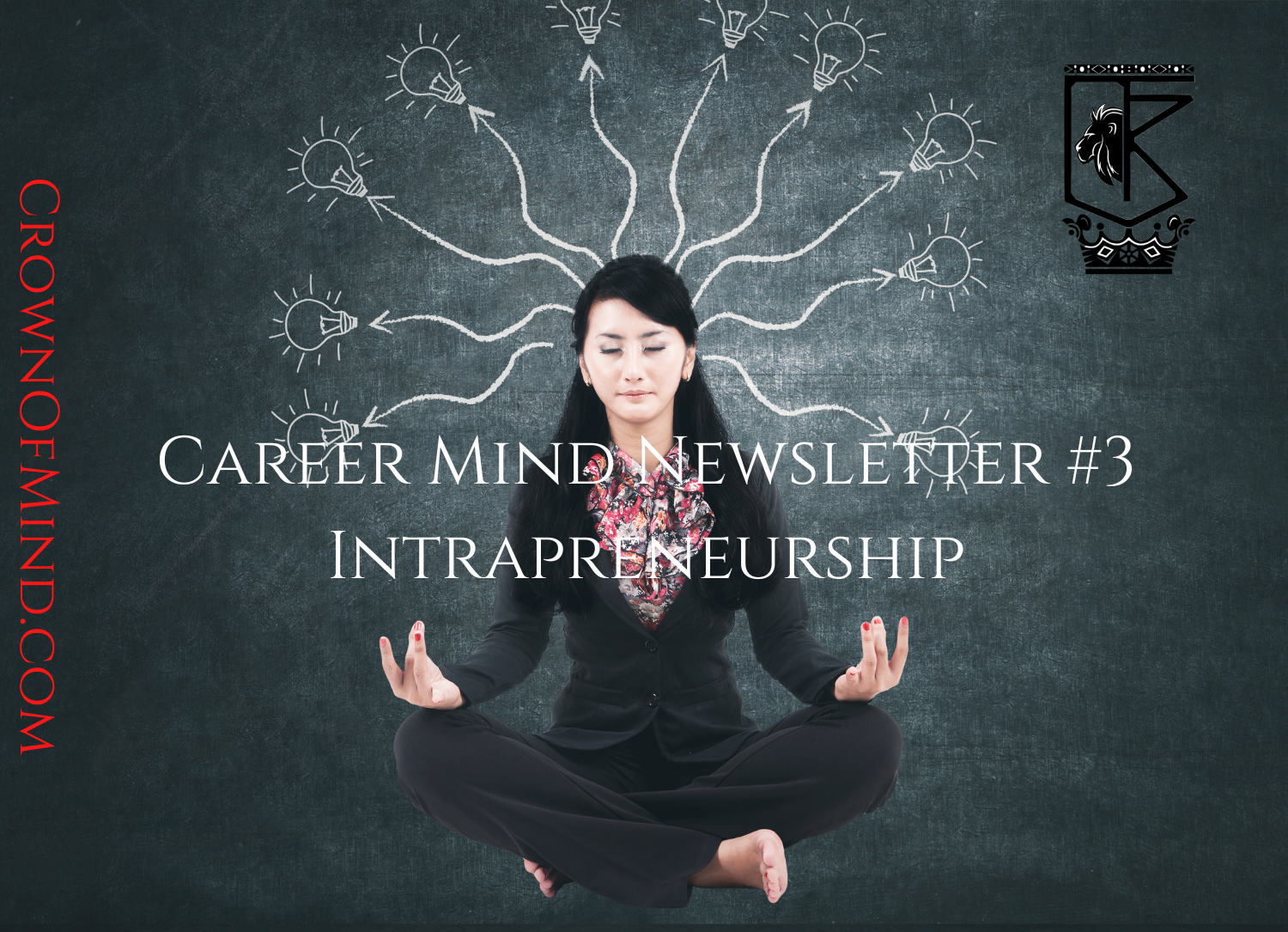Trends & Temptations
Original Post: https://www.linkedin.com/pulse/intrapreneurship-trent-rhodes
Watch YouTube long enough and you may come across several ads from people telling you how you should immediately quit your job, become an entrepreneur and make as much currency as they do in just a few short months.
Their testimonials often appear extreme with statements from clients earning multi-five figures monthly with little to no effort. While I suspect viewers generally have healthy intuitive antennae to recognize when an advertisement is embellished or simply bull$shit, I’m more weary of the underlying thought form communicated in these messages.
That message is: you’re a lesser individual if you work in organizational life, and to no longer be lesser you need to quit your job and just become an entrepreneur.
There’s even a movement advocating for people to just quit working altogether, without an alternative path to living aside from just being.
As an interdependent species, we need not have to delve into the consequences of having millions of people just not using their creativity to contribute to civilization.
Everything we use, if we didn’t make it ourselves is made by nature or numerous people where the product or service eventually reaches us. From clean water spouting from your shower to traffic lights functioning to the device you’re reading this with, interdependence enables us to do what we do. These are organizations at work.
This extreme thinking is consistent with other only-either-or ideologies:
“Just follow your gut.”
“The only way to financial freedom is through stocks, bonds, mutual funds and 401k.”
“To be educated you must attend university.”
I could list a hundred of these pseudo-truisms that cannot stand the weight of critical thinking.
The concepts are absorbed by so many they begin to take on lives of their own. At some point they become strong enough to exist without the need for critical analysis. They’re just followed without examination, assumed true in the collective unconscious.
From social media influencers to drop shipping to website auctioning, a susceptible mind taking in these entrepreneurship themes may think it absolutely must choose either organizational life or entrepreneurship, sacrificing one over the other.
Isn’t it possible to do both?
Couldn’t a professional work in an organization and pursue an entrepreneurial venture?
And another question: What about those who do not want to be full-time entrepreneurs?
Should the millions of people who enjoy working within an organization feel less than because they value work with a company rather than experiencing constructing their own vision and having others work for them?
Mentioned in my previous article and what many entrepreneur gurus fail to explain is entrepreneurship isn’t a title but an energy, a state that comprising a quality/talent combination resulting in a particular work temperament. It can be recognizable at an early age and cultivated over time.
It’s not the same as being a businessperson, which is why you’ll find some entrepreneurs end up bringing on more experienced businesspeople to help their vision become a value-added entity (a business model) that can sustain and grow.
If the entrepreneur acquires business acumen, even better for the creation.
On the contrary, this is why you also see businesses focused on innovation hosting all sorts of contests, competitions and incubators as they try to identify the world’s next visionaries (entrepreneurs).
Savvy businesspeople who know how to operate a model may not necessarily have the visionary gumption to produce new innovations; you need an entrepreneurial mindset for that.
If you built the next revolutionary app right now I’d wager it wouldn’t matter if you had a business or not. Companies would come to you for access to it and would support you with the resources scale (or acquire) it.
I’m reminded of how Nikola Tesla was a scientist-entrepreneur who would’ve removed the planet’s reliance on oil with energy from the universe decades ago, a live version of Faraday from The Man Who Fell to Earth.
Tesla wasn’t a businessman or cutthroat, hence he was toppled by the businessmen named Thomas Edison and Henry Ford who wanted to monetize electricity and automobile power.
Intrapreneurship
As someone who operates both in organizational life and entrepreneurial pursuits, I want to offer a thought vibration that doesn’t receive much attention. A whole area of expertise can be grown here: the intrapraneur.
Wikipedia offers a simple definition so we’re all on the same page, “the act of behaving like an entrepreneur while working in an organization.”
A rebuttal I can anticipate thinking about this is, “What if the company I work for doesn’t support this?”
My response, “If you have a role in a company, you can apply intrapreneurship. First step is to change the thinking from working for the company to working with it. For too long the idea a professional is at the whim of an organization existed. The company/professional dynamic is a relationship not servitude, interdependent such that if every professional left the company there would be no company by definition.”
Intrapreneurship’s “intra” implies this is an internal process, within the organization and you.
This makes your ability to develop intraprenurial skills rather independent from whatever work environment you’re part of. Self-responsibility for guiding your professional trajectory is prerequisite.
Whether your role is administrative assistant or senior project manager, the dimensions we’ll examine below are universal and can be applied.
As an intrapreneur, you’re operating as a business within a business. Your unique role is like a hologram, containing within it the features the organization works on daily.
The company has strategy, you have strategy.
The company has a business plan, you have a professional plan.
The company forecasts, you forecast.
As we are like water droplets sourced from the larger ocean of The All’s creation, different only in quantity but of same quality, your position in a company is a replica of the company’s dynamics, different in quantity but same quality.
The Intrapreneur’s Departments
Marketing: exploring, creating and delivering value for a target market. Can also include branding and advertising as additional domains.
Scope: In your role, especially when first joining the company you develop a reputation, initiated through the interview process.
The whole cycle, from interview touch points to your first 60-90 days you’re setting a tone for yourself and how company peers relate to you.
For example, one of the side effects of negotiation attempts in your interviews is the tone you set for being a person who doesn’t just accept what’s given, that you’re a person who asks questions, inquires and unafraid to explore what’s possible.
Even if your requests aren’t granted, this communication rests underneath compensatory or benefits requests.
In your role there’s some value to be developed and delivered. How well or underperformed you are in it will spread as an energetic wave to those you work with directly and by word-of-mouth to the farther threads in the organizational chart.
Your reputation develops from what you repeatedly do. This becomes more important the more staff there are in the same role.
For example, if you work in a sales-oriented company with many people holding the same sales title, it’s up to you to figure out how you differentiate from the other sales people. They’re your peers but the team isn’t a monolith.
When someone thinks of you among the group, what’s your superpower contribution?
Action: Decide on what kind of reputation you aim to create. Leave it in no one else’s hands otherwise it’ll be created for you. Be capable and willing to present compilations of your work projects, noting the value they offer and results if possible.
Sales: delivering value through products and services. Includes persuasion and relationship-building skills.
Scope: It’s interesting to me how this area is either looked down upon or shunned yet simultaneously one of the most important skills.
Sales has a popular reputation for sleaziness, swindling and disingenuous communication. But if we look at its fundamental experience, presenting value to someone and engaging a transaction, it’s everywhere and unavoidable.
The opposite of selling is thievery not charity.
The only way to get around selling something (an exchange of values) to someone is to literally take what we want out of a transaction without permission; that would be plundering.
If we take with permission, we’re not giving anything back in return; that would be parasitism.
Sales for the intrapreneur involves investing time into understanding the kind of client, customer or stakeholder the particular role supports. Knowing how the unique function contributes to that whole experience and understanding the challenges that can act as rebuttals.
Within inter-team dynamics, the intrapreneur’s sales skills are useful for self-advocacy on proposed ideas. If within a department a professional has an idea, there are four options:
- Don’t sell it at all.
- Let someone else sell it.
- Discuss the idea, concept form only.
- Present the idea with a view that handles the sales cycle one might engage with a customer. Including how it can solve a problem, add value, the experience and potential challenges / rebuttals.
Unless you have total free reign in your organization to do what you want, someone with influence will have to sign off on your idea, so presenting it in an optimal way will serve your cause better than lazily raising it.
Action: Put together a list of the top 3 problems to solve in your role. Explore the sales cycle and apply what’s relevant to your position. Acquire an alchemist’s mindset viewing the problems in her purview as opportunities to present ways to transform them. Develop comfort with propositioning and rejection as some of your ideas may not move or become rearranged into a different form.
R&D: innovative activities undertaken to improve existing products / services, and to produce new. For the intrapreneur, R&D is all about self-development.
Scope: If you’re serious about your craft, you’re likely already engaged in personal learning. I have a special interest in this area because I foresee the dominant learning mode for people becoming more asynchronous and adaptable outside of formal schooling.
Instead of going to an institution for several years for a singular program, unless the field requires it, I envision a future where learners become lifelong autodidacts who can customize personal learning programs according to the desired skills.
To become a surgeon I may need over a decade of formal schooling, but if I wanted to become a designer I could cut that time by customizing protocols for exactly the skills necessary to deploy in the world from my handheld computer.
The key is autodidactism, which is the capacity for self-learning: ability to learn and to create the plan for it. To become an effective self-initiated learner, you need strong meta-skills, which you’ll find plenty of content on them at my blog.
Consequently, R&D for an intrapreneur is one of the most important sectors. You can allow the organization to provide you with what you need to grow or you can multiply that by going after what will accelerate you on your own.
Depending on your region and access, you may have several ways to research and develop:
- Videos
- Books (audio, E-book & physical)
- Newsletter subscriptions
- Conferences & Classes
- Communities
- Blogs
- Digital Learning (Coursera, edX, Udemy)
- Industry Mentors
- Teaching Others
- 10.Personal Projects
Action: Conduct a skills inventory, the professional version of Know Thyself. Make learning an intentional activity rather than passive experience. Identify 3 skills you want to develop. Then choose a learning mode from above. Build a schedule around learning so you have consistency. One of the reasons there’s temptation to simply not follow through is the benefit manifests over the long-term.
R&D for a company and person both involve delayed gratification; in the process you’re investing, exerting energy now to reap cultivation over time.
Administration: skill with maneuvering resources, handling affairs.
Scope: In today’s world you’re likely to encounter documents, forms and processes in some form in your work. They may or may not be the primary functions; either way your ability to be organized with administration influences your mind frame with the rest of your work.
With roles that are more people-oriented and include heavy documentation, like a career or executive coach, it can be tempting to ignore admin in favor of the people. But the admin is necessary for providing the kind of experience a coach wants to offer.
Administration can include well-known systems like Microsoft Suite to more niche platforms like Salesforce. Encountering new systems in your role may challenge you to develop a new way of handling the information flowing to and through you.
When set up, you free up more time for thinking and focus on work creation over excessive ideation.
Action: Organize bookmarks. Create main and sub folders. Use your calendar smart devices to set up prompts for focus. Automate where possible; if you can turn something into a template for repeated use, go for it. On your main device be just as organized. Make it a principle to know where to find your most important materials for the day’s work.
Project Management: skill with completing project goals within specific constraints.
Scope: In our work we have larger team project goals, company goals and the individual. The intrapreneur in you can take the project management cycle and convert it into a personal process for handling your own.
I find time and project management to be interrelated and a contributor to how a professional undergoes goal-attainment.
To manage the project or goal is to be aware of time as a resource, and by extension your mind as the most important. Completing a project in 30 days will ask you to work with time differently compared to 10 days, while the mind’s power can make these milestones achievable in a thriving or suffering orientation.
The “constraints” element tends to be antagonistic rather than a value but doesn’t have to be; if you choose one goal it means you’re committing resources towards it and not something else. If you have multiple projects to work on it’s the same deal: where you focus determines where you also don’t focus in a given time.
Action: Absorb a project management style. When you receive or create a project, be wise and plan accordingly so you can have a map of where you want to be in a certain stage. Use a tool like Excel, Jira, Monday or Notion to transfer concepts into concrete plans. Be willing to take initiative to dissect your project so the action items can be reviewed; it demonstrates leadership by not having to be told your How.










